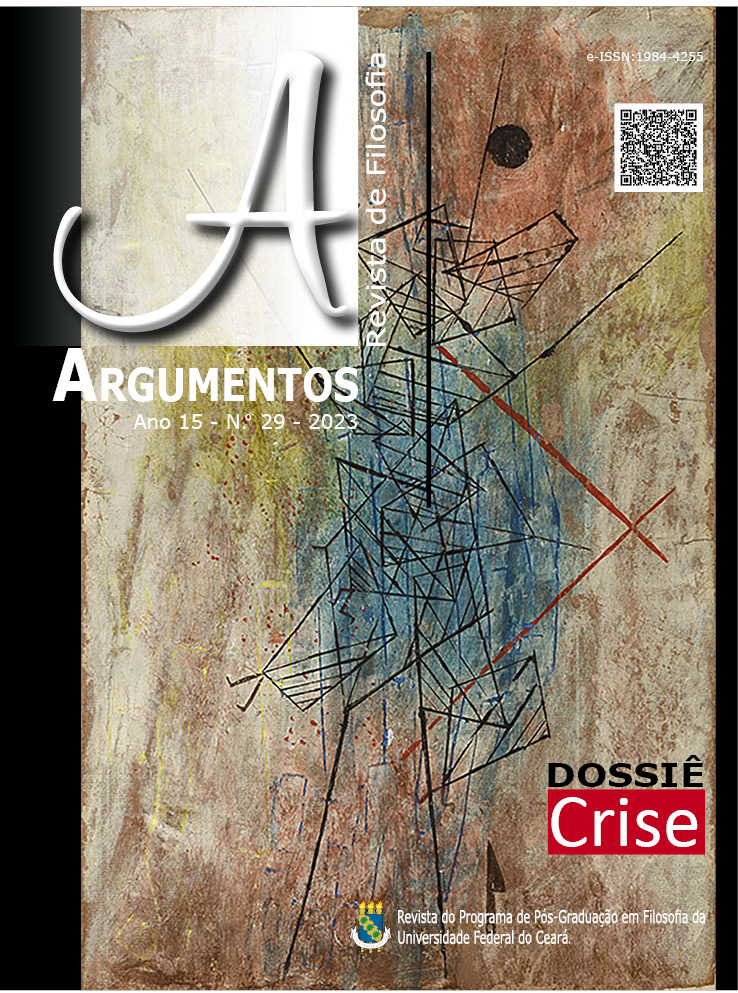Lotze, Husserl an the crise of European science
DOI:
https://doi.org/10.36517/Argumentos.29.8Keywords:
Lotze. Husserl. Crisis. Objetivism. Meaning. Value.Abstract
The crisis of European science is a theme present in German philosophy after the failure of idealism. It finds a decisive expression in the philosophy of Hermann Lotze, an extremely influential author in the second half of the 19th century, who acts as a reference and inspiration in the Husserlian reflection of the 1930s.
References
DEWALQUE, A. Le monde du representable: de Lotze à la Phenoménologie. In: BOCACCINI, F. (Dir.). Lotze et son heritage: Son influence et son impact sur la philosophie du XXe siècle. Bern: Peter Lang, 2015.
FECHNER, G. T. Die Tagesansicht gegenüber der Nachtansicht. Leipzig: Druck und Verlag von Breitkopf und Härtel, 1879.
FISSETE, D. Hermann Lotze and the Genesis of Husserl‘s early philosophy (1886-1901). In: PARKER, R. (Ed.). The Idealism-Realism Debate in the Early Phenomenological Movement. Berlin: Springer, 2021.
GYEMONAT, M. Sur ce que l’antipsychologisme husserlien doit á Lotze. In: BOCACCINI, F. (Dir.). Lotze et son heritage: Son influence et son impact sur la philosophie du XXe siècle. Bern: Peter Lang, 2015.
HAUSER, K. Lotze and Husserl. Archiv für Geschichte der Philosophie. Berlin, v. 85 (2), 2003, p. 152-178.
HEIDELBERGER, M. Nature From Within: Gustav Theodor Fechner And His Psychophysical Worldview. Pittsburgh: University of Pittsburgh Express, 2018.
HUSSERL, E. (1937) Die Krise der europäischen Wissenschaften und die transzendentale Phänomenologie: Eine Einleitung in die phänomenologische Philosophie. Husserliana VI (Hua VI). 2a. Auf. Den Haag: Martinus Nijhoff, 1976.
HUSSERL, E. (1911). Philosophie als strenge Wissenschaft. In: NENON, T.; SEPP, H.R. (Eds.). Aufsätze und Vorträge (1911-1921). Husserliana XXV (Hua XXV). Dordrecht, Boston, Lancaster: Martinus Nijhoff, 1987.
HUSSERL, E. (1934). Praguer Konferenz. In: SMID, R.N. (Ed.). Die Krisis der europäischen Wissenschaften und die transzendentale Phänomenologie. Ergänzungsband: Texte aus dem Nachlass 1934–1937. Husserlina XXIX (Hua XXIX). The Hague: Kluver, 1992.
IOCO, G. Das Schreckbild des Psychologismus: Husserl, Lotze e „linesaurible scrigno” del mondo delle idee. Rivista di filosofia neoscolastica. Milano, n. 3, 2015, p. 623-644.
LOTZE, H. (1876). Logik. Drei Bücher vom Denken, vom Untersuchen und vom Erkennen. Leipzig: Meiner, 1912.
LOTZE, H. Medizinische Psychologie oder Physiologie der Seele. Leipzig: Weidmann’sche Buchhandlung, 1852.
LOTZE, H. Mikrokosmus. Ideen zur Naturgeschichte und Geschichte der Menschheit. Versuch einer Antropologie. Band I. Leipzig: Verlag von S. Hirzel, 1884.
LOTZE, H. Mikrokosmus. Ideen zur Naturgeschichte und Geschichte der Menschheit. Versuch einer Antropologie. Band II. Leipzig: Verlag von S. Hirzel, 1885.
LOTZE, H. Mikrokosmus. Ideen zur Naturgeschichte und Geschichte der Menschheit. Versuch einer Antropologie. Band III. Leipzig: Verlag von S. Hirzel, 1888.
LOTZE, H. Seele und Seelenleben. In: WAGNER, R. (Ed.). Handwörterbuch der Physiologie. Band. III. Braunschweig: Vieweg und Sohn, 1846.
PORTA, M. Edmund Husserl: Psicologismo, psicologia e fenomenologia. São Paulo: Loyola, 2013.
VIGO, A. Juicio, contenido judicativo y verdad según Lotze: La Geltungslogik y su influencia sobre la teoria del juicio en la tradición anti-psicologista de la filosofía de la lógica Alemana. Manuscrito. Navarra, v. 30 (1), 2007, p. 65-99.
Downloads
Published
Issue
Section
License
Argumentos magazine is licensed under an International Creative Commons Attribution License.
The Magazine uses CC BY inclusion
1) The authors retain the copyright granted to the magazine or the right to initial publication, with the work regularly licensed under the Creative Commons Attribution, which allows the sharing of the work with acknowledgment of authorship and initial publication in this magazine.
2) The authors are authorized to contract additional applicable contracts, for non-exclusive distribution of the version of the work published in this journal (for example, publication in the institutional repository or as a chapter of the book), recognition of authorship and initial publication in this journal.
3) Authors are authorized and encourage to publish and distribute their work online (for example, in institutional repositories or on their personal pages) at any time before or during the editorial process, as they can generate productive changes, as well as increase the impact and reference of published work.




.jpg)










._._3.png)
1.jpg)
._._._.png)
